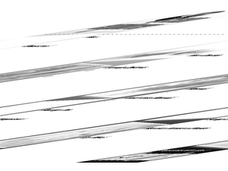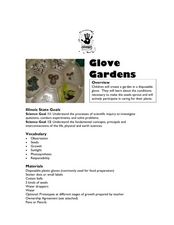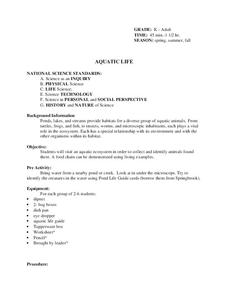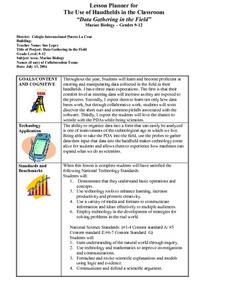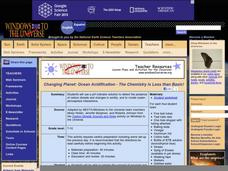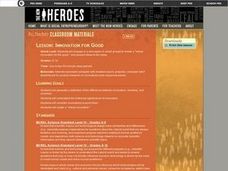Curated OER
Plant Power
Here is an opportunity for your first graders to take a close look at plants: what they need to survive, how they grow, and the names of each plant part. The book, Corduroy's Garden is used to open the lesson. Then, youngsters utilize...
Curated OER
The Birds of a Feather Flock Together
Fifth graders identify all parts of an egg, and explore their importance to the life cycle of a chicken. Learners compare all sorts of birds and place them in categories based on what they look like. This five-day lesson effectively...
Curated OER
Friends on the Farm
Young farmers explore the world of farm animals. They are introduced to a variety of animals, what their role is, how many legs they have, and what sounds they make. Worksheets and websites embedded in the plan are used to carry it out....
Curated OER
Polymers and Products from Petroleum
Over four sessions, learners survey the production and use of polymers and petroleum products. First, they participate in a kinesthetic activity to demonstrate how polymers act, and review a list of common products made from polymers....
Curated OER
Call to Arms: Robotic Analogues for Human Structures
Investigate deep sea discovery through the emerging technology being built. In this physical science instructional activity, young scholars analyze the different types of motion available in the human arm. Students research educational...
Curated OER
Anchialine Cave Species
Ever heard of a stygofauna or a stygobite? How about an anchialine cave? Set your young biologists on a quest to find information about organisms that live in and have adapted to life in caves located near the water. Class members then...
Consortium for Ocean Leadership
Nannofossils Reveal Seafloor Spreading Truth
Spread the word about seafloor spreading! Junior geologists prove Albert Wegener right in an activity that combines data analysis and deep ocean exploration. Learners analyze and graph fossil sample data taken from sites along the...
Curated OER
Glove Gardens
Students investigate how seeds sprout. In this scientific inquiry lesson, students make predictions on which seeds will grow the fastest and observe the seeds over a period of time. Observations are recorded into a journal.
Curated OER
Living Light
Students explain bioluminescence. In this life science lesson, students discuss bioluminescence and conjure examples of organisms that carry this trait and how it is useful in their environment.
NASA
Einstein's Gravity
Assist your high school class with researching and applying the principles of gravity so they may further understand why Einstein is so widely recognized, even today. Individuals compare and contrast two different models that demonstrate...
Perkins School for the Blind
Building an Organic Molecule
Glucose is a simple sugar and a molecule that can be illustrated through modeling. Scientific investigators with visual impairments use hands-on models to reconstruct the process of bonding molecules. The tools used in this activity are...
Curated OER
The Great Kapok Tree by Lynne Cherry
With The Great Kapok Tree, by Lynne Cherry as the hook learners discuss the rainforest, the animals that live there, and conservation efforts. Then, students write a letter to the man in the story asking him not to cut down the Kapok...
Curated OER
Teaching Measurement Through Science
Use these lesson plans to give your students real world practice with measuring distance, mass, and volume.
Curated OER
Science: Entomology in Action
Learners discover how coroners use insect life cycles to estimate the time of death in cases. they describe how forensic entomologists combine environmental factors with insect life cycles to note the changes. Students examine an...
Curated OER
Aquatic Life
Students explore aquatic life. In this science instructional activity, students visit an aquatic ecosystem and collect animals found there. Students create a food chain for the aquatic ecosystem.
Curated OER
??Data Gathering in the Field??
High schoolers demonstrate that they understand basic operations and concpets, students further use technology to enhance learning, increase productivity and and promote their creativity. High schoolers gain an understanding of the...
Curated OER
Bermuda: Search for Deep Water Caves 2009: Out of Darkness
Students analyze the three models on the origin of troglobitic fauna. In this life science lesson, students also consider how the Zonation model explains the fauna's origin. They also use the Internet to research solutional and volcanic...
Curated OER
Reptiles and Amphibians
Introduce your class to various reptiles and amphibians. They will meet and identify a representative from each of the four major reptile families, then learn about and discuss reptile characteristics. Next, they will identify and...
Curated OER
As a Matter of Fact
Elementary-aged scientists discover that all matter has mass. They are shown the difference between mass and weight, and learn how to calculate mass using the appropriate tools and methods. The scientific method is used while estimating...
Curated OER
Changing Planet: Ocean Acidification - the Chemistry is Less than Basic!
A video and laboratory investigation are highlights to this lesson on acidification of ocean water due to increased atmospheric carbon dioxide. Using bromothymol blue (BTB) as an indicator, pupils analyze the amount of carbon dioxide...
Curated OER
The Five Classes of Vertebrates
What a terrific lesson! Learners discuss the animal kingdom, and classify them as vertebrates and invertebrates. They also identify them as fish, amphibians, reptiles, birds, and mammals. There is even a taxonomic breakdown of popular...
Kenan Fellows
How Much Energy Is That Anyway?
The fifth lesson in the six part series introduces units of energy including calories, Calories, and joules. Scholars determine the energy released when eating a snack and during activity.
Curated OER
Innovation for Good
Many historical innovations were created for the common good. Get your students ready for life as a critical thinker with this lesson which defines the differences between innovation and invention. They will conduct Internet research,...
Curated OER
Water Pressure Blaster
Third graders complete an experiment to introduce them to the concept of water pressure. In this water pressure lesson plan, 3rd graders create pressure in a water bottle and observe the force of water that is created.







